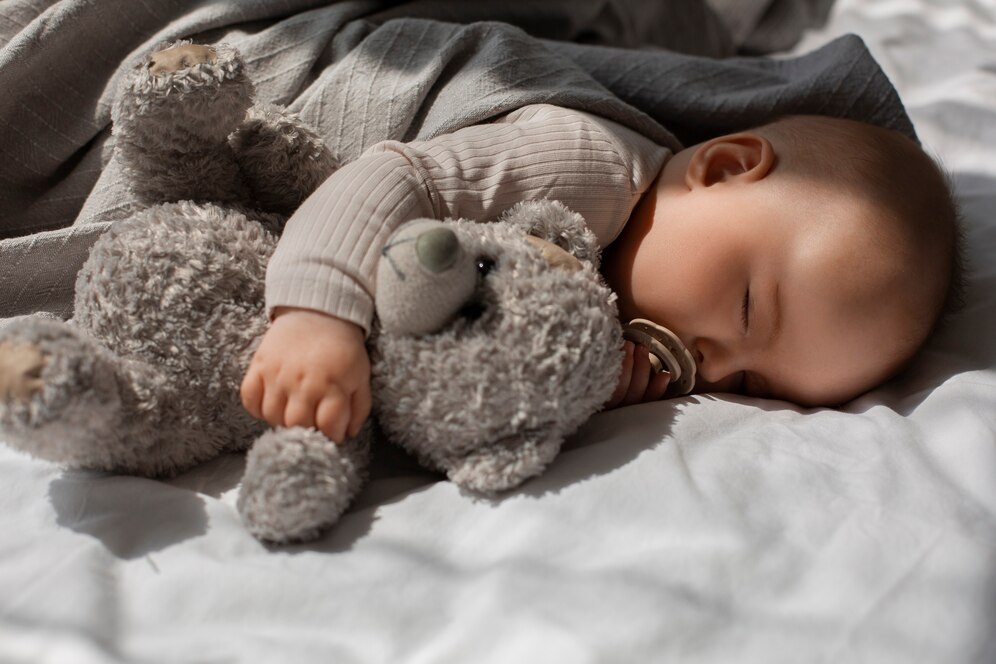The Parenting & Family Blog

The Ultimate Guide to Newborn Sleep Training
Welcoming a newborn is exciting, but it also brings challenges, especially with sleep. Newborns have unpredictable sleep patterns. They can turn your nights into short naps. This guide helps you understand newborn sleep training. It offers practical tips and insights on how to sleep-train your baby effectively. We’ll look at the best baby sleep routines. These will help you and your newborn have restful nights.
Why Newborn Sleep Training Matters

Sleep is a crucial component of a newborn’s development. During sleep, a baby’s brain processes information consolidates memories, and supports physical growth. For parents, a well-rested baby means a more predictable routine and an opportunity for much-needed rest. Many parents feel overwhelmed by the many tips on newborn sleep training. Grasping the importance of good sleep habits early can build a strong base for lifelong sleep health.
Newborn sleep training isn’t about strict schedules. It’s about making a caring space that helps babies develop good sleep habits. When parents focus on good baby sleep routines, they help their newborns feel secure and comfortable. This leads to better sleep for everyone.
Key Benefits of Newborn Sleep Training
Promotes Healthy Development
Consistent sleep patterns are vital for a newborn’s physical and cognitive development. While we sleep, growth hormones are released. At the same time, the brain does important work that helps with learning and memory. Using good sleep tips for newborns helps parents make sure their baby gets the rest needed for healthy growth.
Reduces Parental Stress
Sleep deprivation is a common challenge for new parents, often leading to increased stress and fatigue. Creating a sleep routine helps parents have more predictable schedules. This way, they can lower stress and boost family dynamics. Understanding how to sleep train a baby can transform the early months from a period of exhaustion to one of joy and bonding.
Encourages Independence
While it may seem counterintuitive, sleep training can foster a sense of independence in infants. When babies learn to self-soothe and sleep on their own, they gain confidence and resilience. These skills will help them throughout their lives.
Step-by-Step Guide to Newborn Sleep Training

Step 1: Understand Your Baby’s Sleep Needs
Newborns typically sleep between 14 to 17 hours a day, but this is often broken into short periods. Understanding your baby’s sleep patterns is the first step in establishing a routine. Keep a sleep diary to track when your baby sleeps and for how long. This will help you identify patterns and adjust your approach accordingly.
Step 2: Create a Sleep-Conducive Environment
The environment plays a significant role in how well your baby sleeps. Ensure the nursery is dark, quiet, and at a comfortable temperature. Consider using white noise machines to drown out household noises. A consistent bedtime routine, such as a warm bath followed by a lullaby, can signal to your baby that it’s time to sleep.
Step 3: Establish a Consistent Routine
Consistency is key when it comes to sleep training. Aim to put your baby to bed at the same time each night. This helps regulate their internal clock and sets the stage for a restful night. Incorporate calming activities into your routine, such as reading a book or gentle rocking.
Step 4: Practice Safe Sleep Habits
Safety should always be a priority. Ensure your baby sleeps on their back in a crib free of pillows, blankets, and toys. The mattress should be firm and fit snugly within the crib. These practices reduce the risk of Sudden Infant Death Syndrome (SIDS) and promote safe sleep.
Step 5: Be Patient and Flexible
Sleep training is a process that requires patience and flexibility. Every baby is unique, and what works for one may not work for another. Be prepared to adjust your approach based on your baby’s needs and responses. Remember, setbacks are normal, and progress may be gradual.
Additional Expert Tips & Common Mistakes to Avoid

Expert Tips
- Responsive Settling: When your baby cries, reassure them, but try not to pick them up right away. This teaches them to self-soothe.
- Daytime Naps: Ensure your baby gets enough daytime naps. Overtired babies often have difficulty settling at night.
- Sleep Associations: Notice sleep habits like needing to be rocked. Slowly help your baby move away from these habits. This will support independent sleep.
Common Mistakes to Avoid
- Inconsistency: Inconsistent routines can confuse your baby and hinder progress. Stick to your routine as much as possible.
- Rushing the Process: Sleep training takes time. Avoid rushing through steps or expecting immediate results.
- Ignoring Cues: Pay attention to your baby’s sleep cues, such as rubbing eyes or yawning, and act promptly to avoid overtiredness.
Advanced Insights & Expert Recommendations
Understanding Sleep Cycles
Newborns experience shorter sleep cycles than adults, typically lasting 50-60 minutes. Knowing these cycles can help you predict when your baby will wake up. This way, you can help them settle back to sleep.
Implementing the “Dream Feed”
A “dream feed” involves feeding your baby before you go to bed, typically around 10-11 pm. This can help extend their sleep duration and reduce night wakings, allowing them to enjoy a longer stretch of uninterrupted sleep.
Professional Support
If sleep training becomes overwhelming, consider seeking support from a paediatric sleep consultant. These professionals can offer tailored advice and strategies to suit your family’s needs.
Embrace the Journey
Newborn sleep training is a process that takes time, persistence, and compassion. Sleep tips for newborns and baby sleep routines in this guide. They do this by guiding you in creating a nurturing sleep environment that works for you and your babe. Keep in mind that every baby is different, and it might take time to find what works for you. Be okay with the process, build on small wins, and enjoy the rare and fleeting moments of parenthood.
As you embark on this journey, keep in mind that sleep training goes beyond longer sleep. It’s also about getting your newborn to feel secure and comfortable. You and your baby will find your rhythm with time, patience, and love. This way you will sleep the whole night well and be happy the whole day!
Want to shape your nights with successful newborn sleep training? So give it a go and feel the difference in your family’s well-being and happiness today!









